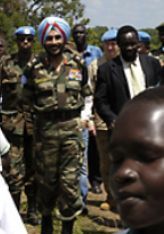Indian peacekeepers reap harvest of goodwill in South Sudan
September 2, 2007 (KHARTOUM) — In the southern town of Malakal, dormant animosity between north and south Sudan can erupt into bloody violence any time. And when it does, it’s the Indian peacekeeping troops that douse the fire and ensure that the oil-rich region does not plunge into chaos.
 Lt. General Jasbir Singh Lidder, force commander of the UN Mission in Sudan (UNMIS) and a tall, handsome Indian Sikh officer at that, does not like to give a nationalistic flavour to the multinational peacekeeping mission he is heading in a country that has been embroiled in a civil war between the Arab-dominated north and black-dominated south over the last four decades.
Lt. General Jasbir Singh Lidder, force commander of the UN Mission in Sudan (UNMIS) and a tall, handsome Indian Sikh officer at that, does not like to give a nationalistic flavour to the multinational peacekeeping mission he is heading in a country that has been embroiled in a civil war between the Arab-dominated north and black-dominated south over the last four decades.
In fact, Lidder makes it a point to emphasise that he is force commander of the entire UNMIS, which has over 10,000 troops in Africa’s largest country, and not just of India.
But the 58-year-old Lidder, who earlier served as additional director-general, military operations, at the Army Headquarters in New Delhi, can’t help showering praise on the good work Indian troops have been doing in a critical and rugged sector in Sudan.
‘In November 2006, full-fledged conflict broke out in Malakal town, with artillery, tanks and heavy weapons being used. In this flare-up, Indian commanders and troops played a proactive role in defusing the crisis, which was commended by the UN and the international community,’ Lidder told a visiting IANS correspondent at the UNMIS headquarters here.
‘Located in Upper Nile, this is the region which borders Line 1/1/56 in the north and has maximum oilfields and other armed groups. We have been experiencing maximum violence and clashes in this sector,’ he explained.
‘Besides the Upper Nile Sector, the IAF Helicopter Contingent, the Force Reserve Battalion, the Transport Company and the Force Signal Company have been performing admirably,’ he added.
India, with its 2,597 troops, is the largest contributing nation to the peacekeeping mission that has been operating for the last two years to maintain the fragile peace that came about after the Sudanese government signed an agreement with the Sudan Liberation People’s Army (SPLA), former rebels who have been pressing for an independent state, in January 2005.
Being the force commander, Lidder has an insight into what makes Indian troops effective in conflict situations, especially in Africa.
‘The bulk of our troops hail from a similar rural culture and, therefore, can sustain the rigours of peace keeping, with pride and smile,’ Lidder said.
‘Besides, traditionally, India has a history of close ties with Africa. Indian troops are well experienced in low intensity conflict and are appreciated for their sheer professionalism, humane and down-to-earth approach.’
Indian troops have also carved a special place for themselves in the minds and hearts of Africans for their enthusiastic involvement in community-related projects.
‘The Indian peacekeepers have been especially active in providing medical and veterinary support, besides engaging in other community development schemes,’ Lidder said.
‘When the violent clashes took place in Malakal in November 2006, Indian troops came out in a big way to assist in humanitarian related activities, especially treating the wounded,’ he added.
Besides, Indian troops, like the other contingents, are engaged in Civil-Military Coordination (CIMIC) programmes and the implementation of Quick Impact Projects (QUIPS), to support the local population, Lidder said.
Is he optimistic about peace and stability returning to Sudan after decades of north-south civil war?
‘The DDR process, that is demobilisation, disarmament and reintegration, is well behind schedule,’ admitted Lidder, a winner of many gallantry awards.
But Lidder is not new to peacekeeping – he served as chief of staff of the UN mission in Mozambique over a decade ago – and prefers to be an eternal optimist.
He is hopeful that the hybrid UN-AU force of nearly 26,000 troops, set to be deployed in Darfur in Sudan’s western province that is entangled in violent tribal conflicts, will be able to make a difference and bring about the much-needed stability to Sudan.
(IANS)
